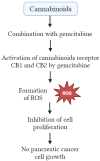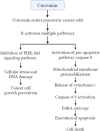A comprehensive review on phytochemicals in the treatment and prevention of pancreatic cancer: Focusing on their mechanism of action
- PMID: 38690008
- PMCID: PMC11056788
- DOI: 10.1002/hsr2.2085
A comprehensive review on phytochemicals in the treatment and prevention of pancreatic cancer: Focusing on their mechanism of action
Abstract
Background and aims: Pancreatic cancer develops in the normal tissues of the pancreas from malignant cells. The chance of recovery is not good, and the chance of survival 5 years following diagnosis is quite low. Pancreatic cancer treatment strategies such as radiotherapy and chemotherapy had relatively low success rates. Therefore, the present study aims to explore new therapies for treating pancreatic cancer.
Methods: The present study searched for information about pancreatic cancer pathophysiology, available treatment options; and their comparative benefits and challenges. Aiming to identify potential alternative therapeutics, this comprehensive review analyzed information from renowned databases such as Scopus, PubMed, and Google Scholar.
Results: In recent years, there has been a rise in interest in the possibility that natural compounds could be used as treatments for cancer. Cannabinoids, curcumin, quercetin, resveratrol, and triptolide are some of the anticancer phytochemicals now used to manage pancreatic cancer. The above compounds are utilized by inhibiting or stimulating biological pathways such as apoptosis, autophagy, cell growth inhibition or reduction, oxidative stress, epithelial-mesenchymal transformation, and increased resistance to chemotherapeutic drugs in the management of pancreatic cancer.
Conclusion: Right now, surgery is the only therapeutic option for patients with pancreatic cancer. However, most people who get sick have been diagnosed too late to benefit from potentially effective surgery. Alternative medications, like natural compounds and herbal medicines, are promising complementary therapies for pancreatic cancer. Therefore, we recommend large-scale standardized clinical research for the investigation of natural compounds to ensure their consistency and comparability in pancreatic cancer treatment.
Keywords: apoptosis; autophagy; curcumin; natural products; pancreatic cancer; phytochemicals.
© 2024 The Authors. Health Science Reports published by Wiley Periodicals LLC.
Conflict of interest statement
The authors declare no conflict of interest.
Figures







Similar articles
-
Pharmacological Modulation of Apoptosis and Autophagy in Pancreatic Cancer Treatment.Mini Rev Med Chem. 2022;22(20):2581-2595. doi: 10.2174/1389557522666220324123605. Mini Rev Med Chem. 2022. PMID: 35331093 Review.
-
Neuroprotective potentials of Lead phytochemicals against Alzheimer's disease with focus on oxidative stress-mediated signaling pathways: Pharmacokinetic challenges, target specificity, clinical trials and future perspectives.Phytomedicine. 2024 Feb;124:155272. doi: 10.1016/j.phymed.2023.155272. Epub 2023 Dec 12. Phytomedicine. 2024. PMID: 38181530 Review.
-
The therapeutic potential of natural products for treating pancreatic cancer.Front Pharmacol. 2022 Nov 2;13:1051952. doi: 10.3389/fphar.2022.1051952. eCollection 2022. Front Pharmacol. 2022. PMID: 36408249 Free PMC article. Review.
-
A Comprehensive Review on Pharmacotherapeutics of Three Phytochemicals, Curcumin, Quercetin, and Allicin, in the Treatment of Gastric Cancer.J Gastrointest Cancer. 2017 Dec;48(4):314-320. doi: 10.1007/s12029-017-9997-7. J Gastrointest Cancer. 2017. PMID: 28828709 Review.
-
Targeting Autophagic Pathways by Plant Natural Compounds in Cancer Treatment.Curr Drug Targets. 2020;21(12):1237-1249. doi: 10.2174/1389450121666200504072635. Curr Drug Targets. 2020. PMID: 32364070 Review.
Cited by
-
Identification of natural phytochemicals as AKT2 inhibitors using molecular docking and dynamics simulations as potential cancer therapeutics.Heliyon. 2025 Jan 10;11(2):e41897. doi: 10.1016/j.heliyon.2025.e41897. eCollection 2025 Jan 30. Heliyon. 2025. PMID: 39897896 Free PMC article.
References
-
- Torre LA, Bray F, Siegel RL, Ferlay J, Lortet‐Tieulent J, Jemal A. Global cancer statistics, 2012. CA Cancer J Clin. 2015;65(2):87‐108. - PubMed
-
- Bray F, Ferlay J, Soerjomataram I, Siegel RL, Torre LA, Jemal A. Global cancer statistics 2018: GLOBOCAN estimates of incidence and mortality worldwide for 36 cancers in 185 countries. CA Cancer J Clin. 2018;68(6):394‐424. - PubMed
-
- Tempero MA. NCCN guidelines updates: pancreatic cancer. J Natl Compr Cancer Netw. 2019;17(5.5):603‐605. - PubMed
-
- Bockhorn M, Uzunoglu FG, Adham M, et al. Borderline resectable pancreatic cancer: a consensus statement by the International Study Group of Pancreatic Surgery (ISGPS). Surgery. 2014;155(6):977‐988. - PubMed
-
- Saha SK, Khuda‐Bukhsh AR. Molecular approaches towards development of purified natural products and their structurally known derivatives as efficient anti‐cancer drugs: current trends. Eur J Pharmacol. 2013;714(1‐3):239‐248. - PubMed
LinkOut - more resources
Full Text Sources

